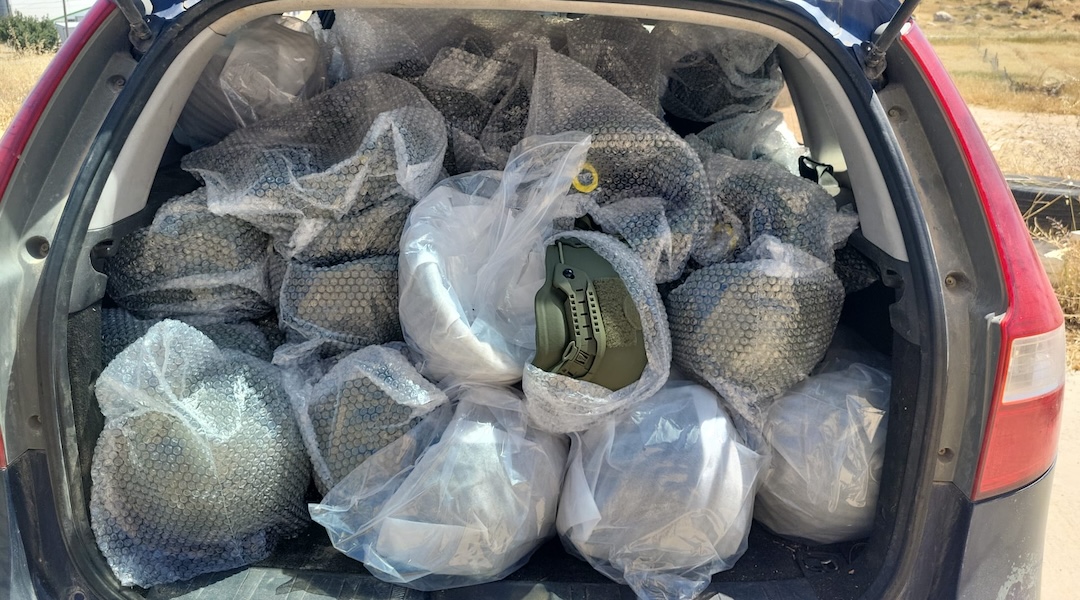
Asaf Elia-Shalev
When Aaron Moshe Shalman was recalled for another round of reserve duty in Israel’s army last month, he took to Facebook, seeking help for his 35-member paratrooper unit.
“We are in dire need of equipment: tactical helmets, tactical uniforms, tactical boots (in all sizes), tactical eyeglasses, knee pads, leathermans, good gun straps, and decent tactical gloves,” Shalman wrote in Secret Jerusalem, a group with tens of thousands of English speakers.
Many responded with offers to help. But the comments also devolved into a heated debate: Why, six months into war, are soldiers like Shalman still relying on the generosity of strangers? Why is the military not supplying the soldiers by itself?
It’s a question shared by many Jews in Israel and the Diaspora. Since Oct. 7, they have been deluged with what can feel like an overwhelming number of fundraising appeals — and have responded by directing more than $1 billion to Israel soldiers, according to a major fundraiser’s rough estimate. As the war goes on, they say they are still glad to help, but can’t shake the feeling that things shouldn’t be this way.
“We want to keep them as safe as possible and we want to help them as much as we can,” Nechama Kravitz, who moved to Israel from Los Angeles in 2022 and has family in the Israeli military, said. “But I am incredibly confused and disturbed about why the government is not capable of supplying their soldiers. If you’re sending your boys to war, you equip them adequately. Why is this being left up to private individuals?”
According to the official line, the Israeli military provides for all the needs of its soldiers. “Today, all soldiers have the required equipment according to their division and mission,” the Israel Defense Forces Spokesperson’s Unit said in an email.
The Israeli military did not respond to further questions, and the Ministry of Defense did not respond at all to inquiries.
In reality, countless Israeli soldiers can be found all over the internet asking the public to donate basic supplies for needed combat or to ensure a minimal level of comfort.
In a widely circulating video, for example, an Israeli soldier explains why the knee pads provided by the military are inadequate. “They were great 10 years ago,” the soldier says in the video. “The straps are worn out and they don’t stay on my leg. They’re very thin, not incredibly comfortable. They passed through numerous soldiers and weren’t taken care of.”
Some of the soldiers — as well as experts in wartime logistics and volunteers who have stepped in to coordinate donations — see the situation as evidence of failures by the Israeli military to anticipate and respond to pressing needs, some with life-and-death stakes.
Micha Shtiebel is an Israeli reserve soldier who was called up for duty on Oct. 7, taking leave from his job at a Silicon Valley-based tech firm to rejoin his combat unit. His unit, with what he described as “very bad gear,” spent a few weeks in gunfights with Hezbollah. After a while, he took on a new role as a logistics officer for a battalion of 450 soldiers. “That’s when I started to appreciate how bad the situation was,” he said. To get his men outfitted with bulletproof vests and helmets, he turned to aid groups.
“I looked at my own bag and the only item in my bag out of around 25 items that is not mine is the bag itself,” he said. “Everything is either self-funded or funded through this network of NGOs. There’s literally hundreds of thousands of reservists who have not been equipped and we’re privately funding ourselves through North American and French Jewry.”

Part of a delivery of tactical helmets to the Israeli army’s Golani Brigade, which were donated by the volunteer initiative Unit 11741 earlier this week in memory of Tomer Grinberg, a soldier killed in combat in December. (Courtesy of Unit 11741 via JTA.org)
In the immediate days and weeks following Hamas’ attack on the Gaza border region, the Israeli government mobilized its standing army as well as hundreds of thousands of reserve soldiers, creating a massive logistical challenge for the country. The shortages raised questions about preparedness, but at that point, it was easy for the public to understand that existing stockpiles of equipment might not be enough for the nearly unprecedented national emergency.
Reservists who happened to be abroad when the war broke out purchased gear wherever they could find it before boarding El Al flights back to Israel. Meanwhile, volunteers flew into Israel carrying duffel bags filled with tents, sleeping bags, toiletries and whatever their relatives or friends who had been deployed said was needed.
Soon, organizations, formal and informal, sprouted up to fundraise and coordinate aid for soldiers. One prominent example is Boots for Israel, which says it has given away more than 46,000 pairs of tactical boots to soldiers. Another volunteer initiative, known as Unit 11741, has delivered some 11,000 tactical helmets to Israeli soldiers.
Demand has far outstripped supply, especially as soldiers have realized they can ask for help rather than go without thermal clothing when it’s cold, settle for blister-inducing army-issued boots, take their chances with helmets from three or four wars ago, or slide into sleeping bags that had been used by who-knows-how-many other people.
“As long as we’re giving out free boots, there’s going to be a need for free boots,” said Michal Wachstock, one of the volunteers behind Boots for Israel. “We’re not fooling ourselves.”
Anecdotal evidence suggests that shortages have been especially dire outside of elite units, which presumably had been prioritized by the military because they are charged with carrying out the most critical missions. Volunteers who have been in touch with rank-and-file soldiers, meanwhile, say the soldiers have faced weeks and months of deployment with subpar equipment, which was especially daunting for those stationed in Israel’s mountainous and frosty north along the border with Lebanon over the past winter.
Age has also played an important role. Whereas the young men of Israel’s standing army might have been too tough, proud or uninformed to complain about the provisions at hand, the reservists are much older and often have higher standards or needs.
“We are not boys of 21 or 22 who can deal with all types of terrain with no problems,” said Shalman over Facebook Messenger. “A lot of people in the unit are in their 30s and 40s and some even in their 50s, leaving their daily lives in order to help the country and have back problems or other health issues.”
Shortages didn’t end with protective equipment or camping gear. Soldiers were also reporting an inadequate supply of flashlights, night vision goggles and rifle scopes for the fighting in Gaza or the conflict with the Lebanese terror group Hezbollah on Israel’s northern border. Civilian volunteers helped obtain those types of items, too — everything short of actual weapons and ammunition.
As the months went on, the volunteer logistical efforts might have been expected to recede as military professionals took over. But that didn’t happen, according to Dotan Sofer, a tech executive and political activist, who started an aid group when the war broke out and has since organized nearly 90 other groups into what he calls “Forum Hachamalim.” The name comes from what the aid groups call themselves — “chamal,” the Hebrew acronym for “war room” that often functions as a stand-in for “headquarters.” The forum helps member groups coordinate and advocate collectively around government decisions affecting their work.
“Forum Hachamlim is more serious than the [IDF’s] Home Front Command,” Sofer said. The aid groups have warehouses — Sofer’s is about 14,000 square feet — and thousands of full-time volunteers fielding thousands of daily requests for supplies from soldiers, he said.
It’s hard to know the exact scope of the giving because the activity is spread out across so many different initiatives. And demand remains high as much of the previously donated equipment has by now been worn out, in a dynamic that highlights just how long the war has lasted, far longer than almost any of Israel’s prior military engagements.
But Sofer roughly estimated that groups like his, with the help of donations mostly from abroad, have delivered perhaps more than $1 billion worth of equipment to soldiers over the past six months.
That volume of philanthropy constitutes a grassroots effort in the same league as the estimated $1.4 billion raised since Oct. 7 through established charities such as Jewish federations, which focus on civilian needs, and Friends of the Israel Defense Forces, which only fulfills formal requests from the military and does not deal in combat gear. The FIDF did not respond to a request for comment.
The scale of charitable donations going to support military supplies for individual units, as suggested by Sofer, is astounding, said Benjamin Soskis, a historian of philanthropy and a senior research associate at the Urban Institute’s Center on Nonprofits and Philanthropy.
Private charity for soldiers in the field was common in the U.S. Civil War and continued even through World War II, but such efforts were eventually eclipsed as the field of charity became more professional and centralized, Soskis said.
Scholars began to notice and talk about the return of what some are calling “grassroots humanitarians” and “DIY aid” during the war in Ukraine. The phenomenon of donating military supplies to soldiers created “the sense that in certain conflicts, the charitable giving was being done outside the guidance of the state — in part, as a recognition of the state’s failure to adequately supply its troops,” Soskis said.
Patrice McMahon, a professor of political science at the University of Nebraska-Lincoln who studies the war in Ukraine, said neither she nor possibly any other scholars in her field have yet realized that a similar thing is going on in Israel.
“My hopefully future son-in-law is from Israel and he was in the Israeli military for many years. I also have friends and colleagues from Israel. So I am surprised to hear the soldiers really need basic supplies,” McMahon said.
The new reality is in part a function of technology, which has been transforming philanthropy in general. The emergence of online crowdsourcing platforms and rapid global peer-to-peer communication have created new modes of aid outside major charitable institutions.
“It’s clear this sort of direct giving to military units is a function of broader currents in charity that are only going to get stronger in the years to come,” Soskis said.
Explanations vary for why, six months into a war, the Israeli military is not adequately supplying its own troops.
Dana Gat is an Israeli travel blogger who turned her social media savvy to the task of aiding soldiers after Oct. 7. “The army is a dumb organization, I don’t have much to say beyond that,” she said in response to an inquiry from JTA.
Most Jewish Israelis serve a mandatory period in the military, and complaining about its incompetence and overwrought bureaucracy is something of a national pastime. But polls have consistently shown a high level of trust in the IDF among Jewish Israelis, and harsh public criticism of the military is considered taboo — especially during wartime.
Shalman, meanwhile, attributes the situation to a certain ethos of scrappiness that is deeply ingrained in the culture of the Israeli military: “What isn’t broken is still good.”
“Even to replace boots is a huge procedure because they have to be completely destroyed ‘til you can get a replacement,” he said. “There has been a feeling of frugality in the army ever since the creation of it.”
Sofer has a zoomed-out view, informed by regular conversations with military personnel at all levels of command. He described how little information about needs and shortages reaches to the top.
“At the General Staff, they tell me, we know of some shortages here and there but nothing like the amount of stuff y’all are bringing in. The brigade commanders say, ‘We know of gaps that are more significant than what our commanders in the General Staff know.’ The battalion commanders say, ‘I have nothing, everything is lacking.’ The company commanders tell me, ‘We don’t even have enough to drink.’ It doesn’t go up the ladder.”
He suggested another explanation as well: “They are ashamed to admit it. The male ego plays a role. If you say, ‘I am short night-vision goggles,’ you’re told, ‘So you have two instead of four? Make do.’ That’s the macho IDF mindset, make do.”
Whatever the reason, the situation is unsustainable, said Lisa Geller, who divides her time between the United States and Israel, where her three of her four children live, and whose job is to help corporations identify and correct inefficient operations.
She was one of the many people who dedicated themselves to helping the civilians evacuated from Israeli towns along the Gaza border after Oct. 7. (The government has subsidized housing for people relocated from the zone but civil society has addressed many other needs.) And she said the lesson she learned then applies to the soldier supply issue as well.
“We gave out hundreds of meals a day. We were cleaning apartments, setting it up you know for the incoming people that were being evacuated. It was a crazy scramble. And after a while, we realized we cannot replace the government,” Geller said. “We tried hard, we were giving of our own time our own money, putting our jobs on hold, doing everything we possibly could. And at the end of the day, the most well-meaning people in the world cannot replace an entire government.”






